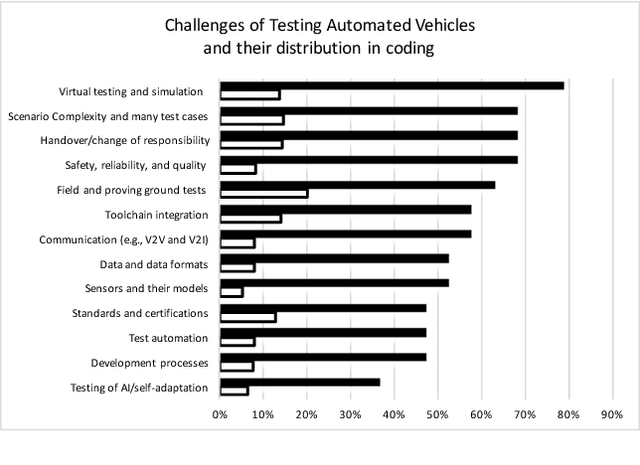Alessia Knauss
Automotive Perception Software Development: An Empirical Investigation into Data, Annotation, and Ecosystem Challenges
Mar 10, 2023Abstract:Software that contains machine learning algorithms is an integral part of automotive perception, for example, in driving automation systems. The development of such software, specifically the training and validation of the machine learning components, require large annotated datasets. An industry of data and annotation services has emerged to serve the development of such data-intensive automotive software components. Wide-spread difficulties to specify data and annotation needs challenge collaborations between OEMs (Original Equipment Manufacturers) and their suppliers of software components, data, and annotations. This paper investigates the reasons for these difficulties for practitioners in the Swedish automotive industry to arrive at clear specifications for data and annotations. The results from an interview study show that a lack of effective metrics for data quality aspects, ambiguities in the way of working, unclear definitions of annotation quality, and deficits in the business ecosystems are causes for the difficulty in deriving the specifications. We provide a list of recommendations that can mitigate challenges when deriving specifications and we propose future research opportunities to overcome these challenges. Our work contributes towards the on-going research on accountability of machine learning as applied to complex software systems, especially for high-stake applications such as automated driving.
Paving the Roadway for Safety of Automated Vehicles: An Empirical Study on Testing Challenges
May 09, 2017



Abstract:The technology in the area of automated vehicles is gaining speed and promises many advantages. However, with the recent introduction of conditionally automated driving, we have also seen accidents. Test protocols for both, conditionally automated (e.g., on highways) and automated vehicles do not exist yet and leave researchers and practitioners with different challenges. For instance, current test procedures do not suffice for fully automated vehicles, which are supposed to be completely in charge for the driving task and have no driver as a back up. This paper presents current challenges of testing the functionality and safety of automated vehicles derived from conducting focus groups and interviews with 26 participants from five countries having a background related to testing automotive safety-related topics.We provide an overview of the state-of-practice of testing active safety features as well as challenges that needs to be addressed in the future to ensure safety for automated vehicles. The major challenges identified through the interviews and focus groups, enriched by literature on this topic are related to 1) virtual testing and simulation, 2) safety, reliability, and quality, 3) sensors and sensor models, 4) required scenario complexity and amount of test cases, and 5) handover of responsibility between the driver and the vehicle.
 Add to Chrome
Add to Chrome Add to Firefox
Add to Firefox Add to Edge
Add to Edge